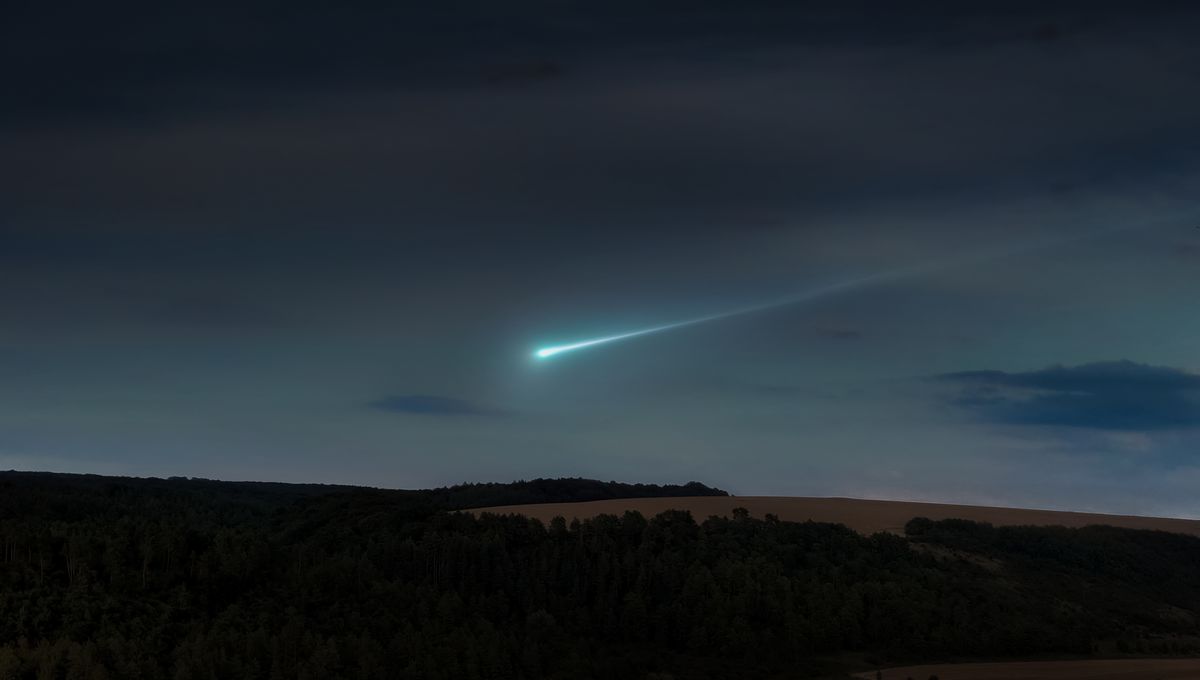
People have reported hearing meteors for more than a thousand years. Back when no one knew what they were, there was little reason to doubt them. Once we understood what caused lights to flash across the night sky, the sounds were assumed to be a collective delusion. Proof that meteors are sometimes accompanied by noises has inspired several explanations, but as of yet, none have been confirmed.
Bright meteors are such an exciting phenomenon that getting sound as well seems a little like gilding the lily. Certainly, even among experienced sky gazers who have seen thousands of meteors, including some very bright ones, few have noticed any accompanying sounds. Yet occasional reports do occur, almost always in association with exceptionally bright objects, those at least as bright as a half-moon.
Why the obvious answers are wrong
Such bright meteors are caused by rocks burning up in the Earth’s atmosphere. However, whatever sound waves accompany the heat and light can’t be what we are hearing.
The reason why is that when sounds are reported they are simultaneous, or very nearly so, with sighting the meteor. Light travels much faster than sound, and just as there is a gap between seeing lightning and hearing the associated thunderclap, any sound produced directly by the meteor would be heard on delay. Indeed, meteors are much further above our heads than the lightning we typically see during a storm – there should be minutes, not seconds, between light and sound.
Unsurprisingly then, it was assumed the sounds were imagined – in all the excitement of seeing a flash that might be once in a lifetime, it wouldn’t be surprising if a sort of synesthesia occurred. Even Edmond Halley, having been one of the first to realize how high meteors must be when we see them, described reports of a “hiss” from an enormous fireball as “the effect of pure fantasy”.
However, in 1978, a meteor over New South Wales produced such widespread independent reports of sounds that Colin Keay, of Australia’s University of Newcastle, was forced to reconsider. Any possible doubts were put to rest during the 1998 Leonid shower. Although not the meteor storm (more than 500 an hour) that was anticipated, the event did produce some very high-quality meteors. Sounds from two of these over Mongolia were recorded by microphones, as well as reported by observers.
Since the meteor’s flash travels to an observer’s eyes at the speed of light, the sound must somehow get to their ears equally fast. That means that rather than being produced in the upper atmosphere, energy must be transmitted by some form or electromagnetic radiation, which then induces sound so close to the observer the two senses appear stimulated simultaneously.
Possible explanations for how we hear meteors
Keay proposed radio frequencies as the mode of transmission, since they often accompany the production of visible light. They would also pass through the atmosphere more easily than some other parts of the electromagnetic spectrum.
The astronomer proved the explanation was credible by demonstrating in the lab that very low frequency radio waves could make objects like pine needles and hair rustle.
However, just because radio waves could theoretically provide the intervening step does not mean they do. Evidence to confirm Keay’s explanation is still lacking.
In 2017, researchers at Sandia National Laboratory hit on an alternative. They noted that bright lights can heat objects enough to cause them to move. Alexander Graham Bell, (possibly) the inventor of the telephone, noted the phenomenon in 1880, but in relation to bright sunlight rather than meteors.
The Sandia team showed wigs will produce a soft but audible rustle when stuck by light of the right frequency. There is no reason to think your own hair is any different, although if bald people or those with buzz cuts report hearing meteors, there might be a problem. Depending on the speed of the meteor, any of the sounds reported, variously described as “popping, swishing and sizzling” should be possible, the team claim.
There has been little opportunity to test whether optical or radio transmissions are responsible for meteor sounds, however. After all, noisy meteors are so unpredictable there are rarely instruments set up to investigate further.
However, it is possibly significant that one of the Leonids whose sound was recorded in 1998 was only magnitude -6.5. Although very bright by most standards (about four times that of Venus at its brightest), this was around 100 times fainter than most meteors reported to be accompanied by sound. The other loud meteor of that night was magnitude -12, similar to the Moon a couple of nights before full.
It seems unlikely a -6.5 magnitude meteor would be bright enough to produce the heat required for the Sandia team’s proposal, so perhaps the radio wave theory has the advantage. However, observations of around 650 bright meteors over Colorado found none associated with very low frequency radio waves that did not have more likely explanations.
The team that made the Leonid recordings argue the transmission may come not directly from the meteor, but from atmospheric phenomena such as charge separation caused by its passage. Electric charging of dust in the meteor’s wake has also been observed.
One further problem remains, though. Either radio waves or light need to stimulate movement for one of the explanations to be right. However, the microphones used for the Leonid study were placed in a location the authors describe as: “Devoid of life, any human or animal nocturnal activity, power lines, and AC electrical equipment of any sort.” What did the vibrating?
Source Link: Why Do People Sometimes Hear Meteors?